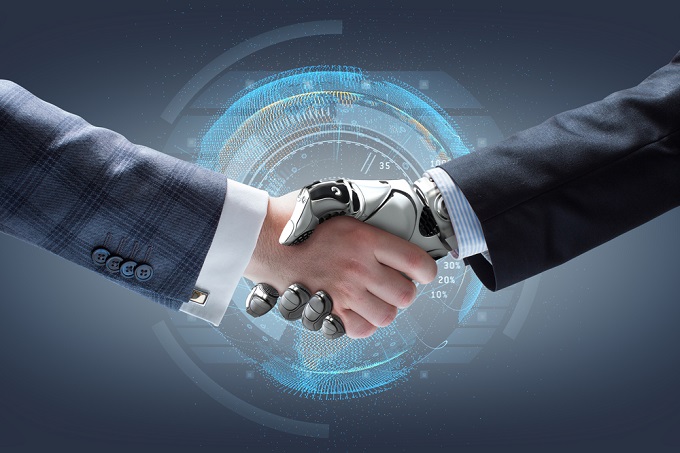The adoption of artificial intelligence (AI) has been hailed by some as a technological revolution set to eclipse the invention of the wheel, steam engine, automobile, or even the internet in terms disrupting economy and society.
Optimists believe that AI will allow humans to accelerate productivity, squash inefficiencies, and create a world free from want.
Pessimists see the accelerating pace of AI development, without protective legislation, to be the greatest threat to society since the creation of the nuclear bomb.
For optimists and pessimists alike, the future of AI and automation in the workplace, and its ramifications for business and society is of paramount concern.

AI and Jobs
Machines and robots have a long history in factories, completing physical tasks. However, new information technologies demonstrate increasing abilities to complete tasks that involve the collection and manipulation of information in routine ways — traditionally done by human brains. Companies are taking advantage of this: in a Deloitte survey, 41% of company respondents had either fully implemented or made significant progress in adopting cognitive and AI technologies, and another 35% reported the existence of pilot programs.
As technology develops, routine tasks suitable for automation make up an increasing portion of labor across industries. According to McKinsey, half of all jobs in China have the potential to be automated. Jobs like telemarketers, technical writers, and accountants are projected to rapidly disappear, whereas occupations that rely heavily on human abilities in manual dexterity, creative intelligence, and social intelligence will survive and thrive in the future workplace.
In the modern economy, the fundamental elements of work are “tasks” which are aggregated into jobs and roles. Some tasks are routine and repetitive. For instance, 50% of the overall time people in finance and insurance spend working is devoted to collecting and processing data, which has a high potential for automation. Each task is an input into the job as a whole and each plays an essential role. This means that technological improvements in one task do not remove the need for the others, and actually increase the value of the other tasks.
AI and Business Development
The workforce of the future will be augmented by technology, and it is the role of HR to orchestrate the redesign of jobs and to train the augmented workforce.
Fully capitalizing on the interaction between technology and employment requires thinking about how human labor can complement new technology, rather than thinking about the full substitution of technology for people. As people step away from routine tasks, skills like problem-solving, creativity, management, listening, and moral decision-making will be increasingly important to build the human connections on which businesses run.
China has more labor associated with activities that can be technically automated than any country in the world (see our post on automation and manufacturing here). Helping the labor force in affected industries to adapt and gain relevant new skills will be an important challenge, critical to maintaining public welfare, social stability, and allowing businesses to reach their full potential.
On 13 March 2018, Collective Responsibility will host an executive workshop, where speakers will shed light on the future of AI/robotics and discuss the challenges and opportunities facing various industries. And it’s not too late to register!
AI and Cities
With 25 megacities and more than ten million urban populations, the world will see unprecedented challenges posed by urbanization, including pollution, landfill waste, and traffic congestion. AI and automated technologies could be a powerful influence on the development of future cities and even the panacea for the ills of urbanization.

AI provides a useful tool to make infrastructure safer and deploy maintenance resources more efficiently. The city of Shanghai has successfully employed AI technologies to track the deterioration of bridges. This task, which is usually done manually, was seen to be an accurate and effective approach for monitoring structures.
Traffic congestion is another problem prevailing in urban areas all over the world, to which autonomous vehicles might become a solution. According to a study from the University of Michigan Transportation Research Institute, the widespread adoption of autonomous personal vehicles will cut the average car ownership per household by 75%, thus alleviating pollution and gridlocks.
AI and automation have not yet neared their full potential for economic disruption. According to research from McKinsey, twelve new technologies that are in their early stages of adoption could double global GDP by 2025. Cities are the bases for technology development given their capacity for research and capacity for investment.
AI will permeate so many aspects of urban life, with some of the most important applications of AI will help to make the cities of the future livable and healthy. No matter you are an entrepreneur, an investor, or an innovator seeking some of the best opportunities in an upcoming AI era, do not hesitate to join us at the Collective Forum on 13 March 2018 to explore AI innovations and business opportunities in Chinese cities and beyond.
